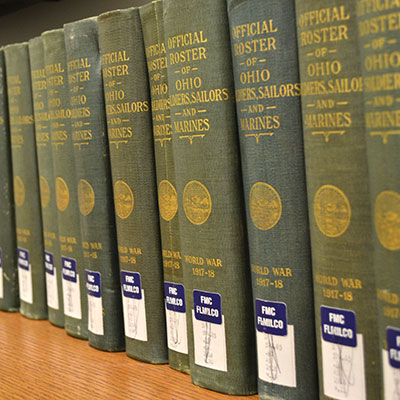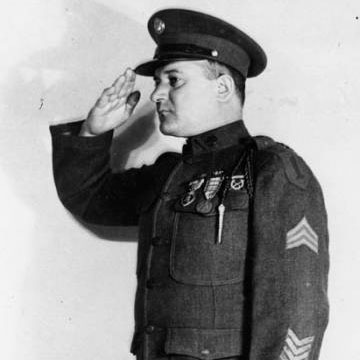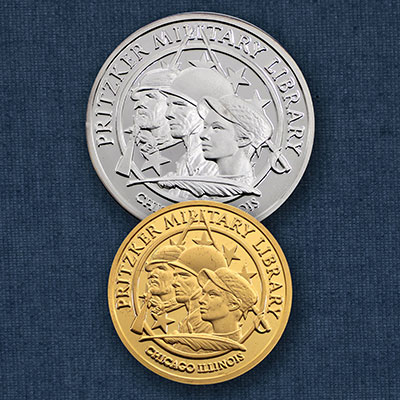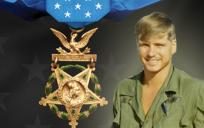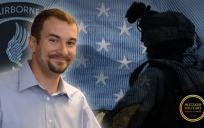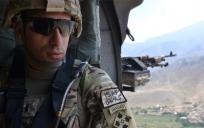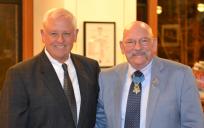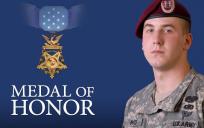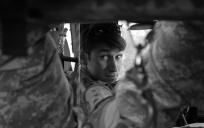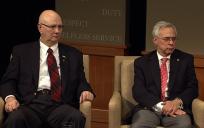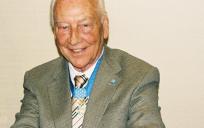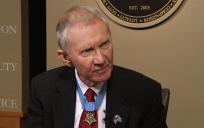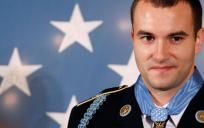
Record date:
Medal of Honor Recipient Richard Pittman Interview
As a high school student, Pittman was inspired by President John F. Kennedy's inaugural address, and decided that his call to service lay in the military. There was one significant obstacle, though: Pittman was legally blind in one eye.
Turned down by the Army, Navy, and Air Force, he was finally accepted by the Marine Corps Reserve - and then, during training, he began pushing for a transfer to active duty. Within a few months, Pittman was in South Vietnam, serving as a rifleman with the 5th Marines near the Demilitarized Zone (DMZ), which separated the South from the North.
However, July 24, 1966 would ask more of Pittman than he could have ever expected. At that point in the war, the North Vietnamese Army had made few major incursions into South Vietnam. But that day, they crossed the border and caught Pittman's company by surprise. He was at the rear when the attack began, on a narrow jungle trail, but he raced toward the sound of the heaviest fighting. After silencing two enemy positions, Pittman arrived at the front and hit the enemy with everything he had, providing valuable cover for his wounded comrades. When his own weapon was disabled, Pittman grabbed an enemy machine gun and resumed firing; when it ran out of ammunition, he grabbed a pistol, and when that was empty, he threw the very last weapon he could find - a grenade. The North Vietnamese had seen enough and decided to retreat. The battle had come with a severe cost, though: two-thirds of Pittman's company had been wounded or killed.
In 1968, shortly after he was discharged, Richard Pittman received the Medal of Honor from Kennedy's successor, President Lyndon B. Johnson. He re-enlisted in the Marines two years later. Having spent twenty-one years answering the call to service he heard as a high school student, Pittman retired from active duty in 1988.
His Citation Reads:
For conspicuous gallantry and intrepidity at the risk of his life above and beyond the call of duty. While Company 1 was conducting an operation along the axis of a narrow jungle trail, the leading company elements suffered numerous casualties when they suddenly came under heavy fire from a well concealed and numerically superior enemy force. Hearing the engaged marines' calls for more firepower, SGT Pittman quickly exchanged his rifle for a machinegun and several belts of ammunition, left the relative safety of his platoon, and unhesitatingly rushed forward to aid his comrades. Taken under intense enemy small-arms fire at point blank range during his advance, he returned the fire, silencing the enemy position. As SGT Pittman continued to forge forward to aid members of the leading platoon, he again came under heavy fire from two automatic weapons which he promptly destroyed. Learning that there were additional wounded marines 50 yards further along the trail, he braved a withering hail of enemy mortar and small-arms fire to continue onward. As he reached the position where the leading marines had fallen, he was suddenly confronted with a bold frontal attack by 30 to 40 enemy. Totally disregarding his safety, he calmly established a position in the middle of the trail and raked the advancing enemy with devastating machinegun fire. His weapon rendered ineffective, he picked up an enemy submachinegun and, together with a pistol seized from a fallen comrade, continued his lethal fire until the enemy force had withdrawn. Having exhausted his ammunition except for a grenade which he hurled at the enemy, he then rejoined his platoon. SGT Pittman's daring initiative, bold fighting spirit and selfless devotion to duty inflicted many enemy casualties, disrupted the enemy attack and saved the lives of many of his wounded comrades. His personal valor at grave risk to himself reflects the highest credit upon himself, the Marine Corps, and the U.S. Naval Service.
